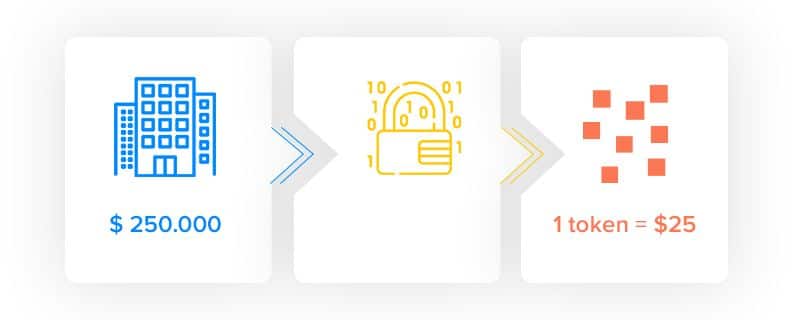Tokenization

What is Tokenization?
The process of generating a blockchain token to digitally represent any actual marketable asset so that you may trade even a little portion of it is known as asset tokenization.
Tokens are frequently used to represent a variety of real-world assets, including as tangible items, stocks, real estate, art, and other physical and non-physical stuff. They also represent ownership, or a claim to a share of the asset. Tokens can be easily purchased, sold, and exchanged.

Understanding Tokenization
Within the bitcoin and blockchain ecosystem, tokens come in a variety of forms and have varying functions. These functions include digital currency, governance and collectible ones. There are some types of tokens that are used in blockchain:
- Cryptocurrencies: Digital currencies – Bitcoin and Ethereum.
- Non-Fungible Tokens (NFT): Digital assets that signify possession of certain goods or virtual assets
- Protocol Tokens: Crucial part of blockchain networks functioning
- Utility tokens: Tokens, frequently based on the Ethereum, that are used to access particular services
- Governance Tokens: Tokens that provide voting rights to the users
- Wrapped Tokens: Tokens with the value of a native token from another blockchain
- Asset-Backed Tokens: Physically existing assets like properties or precious metals
- Security Tokens: Tokens that reflect ownership in conventional financial assets and are protected by the law
- Stablecoins: Tokens that are attached to the fiat currencies to remain stable
The financial sector might be significantly impacted by tokenization, which might change how financial assets are created, exchanged, and maintained. This could lead to improvements in liquidity, lower transaction costs, and easier access to financial assets. It is, however governed by regulations, and regulatory organizations work to make sure that any relevant laws are fulfilled.
Another industry that benefits more from the creation of tokenized assets is real estate. The idea of tokenizing real estate simplifies the investing process in all the variants, there are no agents involved, communication between buyers and sellers is simpler. Additionally, it allows any amount of investment, which improves the market for everyone.
While tokenization provides a lot of benefits, it may also have severe drawbacks and issues that should be pointed out. State-by-state variations in tokenization rules are still being worked out. Even with blockchain technology’s general security, tokenization software and smart contracts might still have vulnerabilities. The flaws in the security systems can cause significant losses. Tokenization may also lead to market instability and speculative bubbles, especially in the utility and cryptocurrency spaces.
Before tokenizing assets, it is crucial to considering risks and conduct a due diligence in order to be aware of these possible drawbacks.
Latest News about Tokenization
- Coinbase’s research highlights the evolution of tokenization in the financial world, from representing ownership of tangible assets to digitizing financial assets like sovereign bonds and money market funds. However, challenges remain, particularly around infrastructure and jurisdictional boundaries. The Federal Reserve’s rate hikes and the crypto market sell-off in 2022 have revived interest in blockchain’s core value. Successful mainstream integration depends on consolidation efforts focusing on financial verticals, jurisdictional limits, and technology stacks.
- Tokenisation is revolutionizing the way assets are represented, transferred, and managed, with central banks like Australia’s Reserve Bank exploring its potential. The Australian government introduced proposals to govern digital assets, requiring platforms to align with current financial services laws. Central banks worldwide are exploring Central Bank Digital Currencies (CBDCs), which could streamline atomic settlements in tokenised asset markets. The global financial market’s adaptability and forward-thinking approach demonstrate the potential benefits of embracing digital currency and tokenized assets.
Latest Interview about Tokenization
- The Boson Protocol aims to enable the sale of physical products as NFTs, overcoming the challenge of granting NFT vouchers without requiring a guarantee. The protocol design was based on physics and game theory, and the team raised funds and assembled a team. The Boson app is market infrastructure, providing free tools for selling physical items as NFTs via custom Web3 commerce stores or metaverse stores. Mechanisms to ensure quality include optional seller deposits, dispute mechanisms, and a system for resolving disputes. The platform is now focused on adoption and usage.
Disclaimer
In line with the Trust Project guidelines, please note that the information provided on this page is not intended to be and should not be interpreted as legal, tax, investment, financial, or any other form of advice. It is important to only invest what you can afford to lose and to seek independent financial advice if you have any doubts. For further information, we suggest referring to the terms and conditions as well as the help and support pages provided by the issuer or advertiser. MetaversePost is committed to accurate, unbiased reporting, but market conditions are subject to change without notice.
About The Author
Victoria is a writer on a variety of technology topics including Web3.0, AI and cryptocurrencies. Her extensive experience allows her to write insightful articles for the wider audience.
More articles

Victoria is a writer on a variety of technology topics including Web3.0, AI and cryptocurrencies. Her extensive experience allows her to write insightful articles for the wider audience.


















































